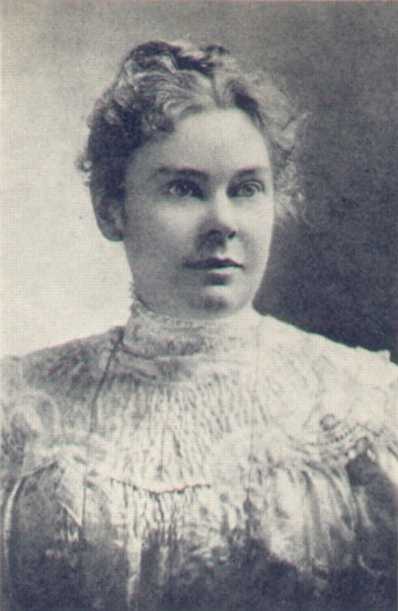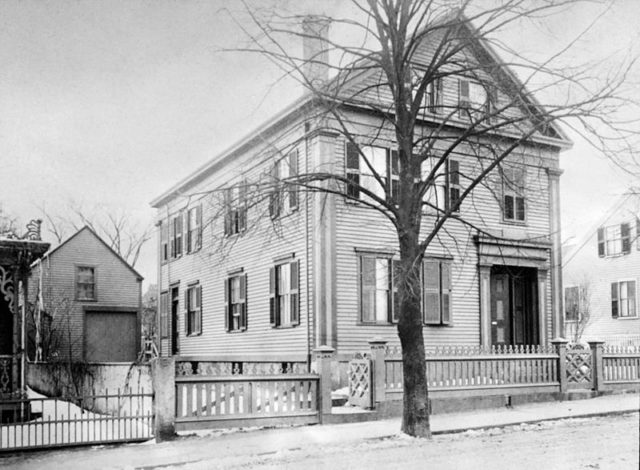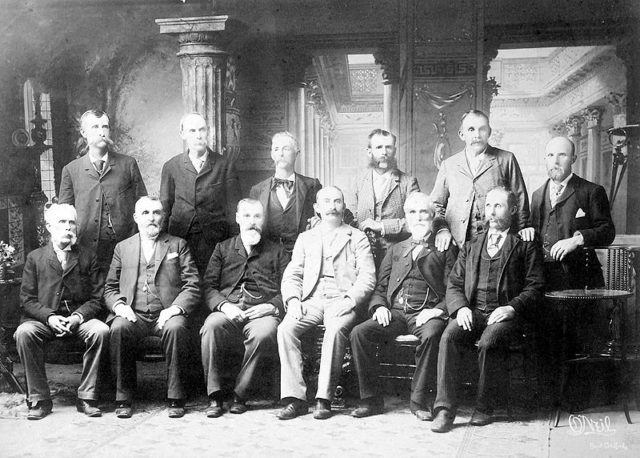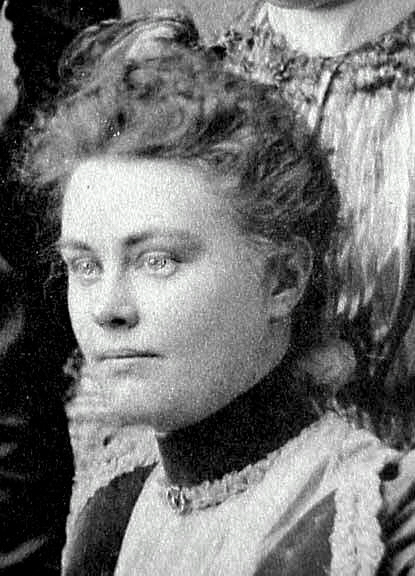The murder one August day of Andrew and Abby Borden in their comfortable home in Fall River, Massachusetts, took grip of the American imagination 125 years ago and has never let go. If anything, the grip is tightening. The reason? Everyone’s fascination with Andrew Borden’s younger daughter, Lizzie, who was arrested, tried for the murders, and acquitted.
The Commonwealth of Massachusetts never charged anyone else with the grisly double murder. Lizzie lived the rest of her life in Fall River, unmarried and largely ostracized, finally dying of pneumonia at age 66.
“Lizzie Borden took an ax and gave her mother forty whacks. When she saw what she had done, she gave her father forty-one. Lizzie Borden took an ax and gave her mother forty whacks. When her body hit the floor, she gave her father forty more.”
The rhyme is a variation on a song dedicated to Lizzie Andrew Borden, who gained infamy during her trial, an infamy that just never went away. Authors have penned multiple books; Elizabeth Montgomery played Lizzie in a 1975 TV movie; and two musicals have been staged. Most recently, Christina Ricci starred in the TV series The Lizzie Borden Chronicles. Before the end of the year, the feature film Lizzie will hit the big screen, starring Chloe Sevigny and Kristen Stewart.
Author Dawn Ius, who reimagines the story in Lizzie, a Young Adult novel being published by Simon Pulse in April 2018, says, “On paper, Lizzie Borden didn’t seem capable of bludgeoning her parents with a hatchet, but as I began to unravel the layers of her life, some motives began to emerge.”

Indeed, the family history of the Bordens is a tense and tangled one.
Andrew Borden came from a financially modest family, but he managed to prosper by manufacturing and selling furniture and caskets. He became a successful property developer who directed a few textile mills. Mr. Borden owned various commercial properties as well. He was a director of Trust Co. and the Durfee Safe Deposit, and also a president of the Union Savings Bank. When he died, Borden’s estate was estimated at $300,000 (equivalent to $8 million in 2016).
Lizzie and her older sister, Emma, were educated in a religious spirit and attended Central Congregational Church. Lizzie was involved with many church activities, such as teaching Sunday school to the children of immigrants who had recently moved to America. If she wasn’t at her own church, Lizzie spent her time at other religious organizations. She served as secretary-treasurer at the Christian Endeavor Society. She was also a member of the Women’s Christian Temperance Union (WCTU) and the Ladies’ Fruit and Flower Mission.
In 1863, when Lizzie was only three years old, her mother died. After three years, Mr. Borden remarried, to Abby Durfee Gray. The two girls, Lizzie and Emma, apparently didn’t get along with their stepmother. Lizzie didn’t even try to hide the nature of their relationship during the police questioning, stating that Mrs. Borden, as she used to call her stepmother, was interested in her father’s money.
At the time of the investigation, Bridget Sullivan, the Bordens’ live-in maid, testified that the two girls almost never ate the meals together with their parents. The maid also told how earlier that year, Lizzie had built a new roost for the pigeons and Mr. Andrew Borden killed the pigeons, believing that they attracted local children to hunt them. Lizzie got very upset and it led to a family fight that resulted in both sisters taking extended “vacations” at the Bordens’ property in New Bedford. Lizzie returned to Fall River just a week before the murders.

The family tension had increased in the months preceding the murders, especially after the stingy Andrew started gifting Abby’s family with real estate. When Abby’s sister received a house, the sisters demanded the house where they lived before the death of their mother and received it from their father for $1. Just a few weeks before the murders, the sisters sold the property back to Andrew for $5,000 (equivalent to $133,000 in 2016).
There was a sudden visit from Lizzie and Emma’s uncle, their mother’s brother, who was invited to stay for a few days in the house and discuss business, which again heated the atmosphere in Borden home. Also, for a few days before the murders, the entire household became violently ill. Since Andrew wasn’t a popular man, his wife, Abby, suspected poisoning.
On the 4th of August, 1892, Abby and Andrew Borden were murdered in their home. Abby was killed first, between 9:00 a.m. and 10:30 a.m., while Andrew died between 10:30 a.m. and 11:10 a.m. Unlike the song, Abby didn’t suffer 40 but rather 18 or 19 blows, while Andrew received 11. The 19 hits that killed Abbey were delivered directly to the back of her head. At the time, Andrew was out for his morning walk. When he got back to the house, Andrew was surprised to find that his key failed to open the door. Bridget, the house maid, went to help him, but she too couldn’t unlock the door, as it was jammed. She later testified that at that moment she heard Lizzie laughing from the top of the stairs.
Lizzie later denied being upstairs at that time and testified that when her father got into the house, she rushed to help him take off his boots and put on his slippers before he stretched out on the sofa for a nap. She also testified that when he got in, Andrew asked her where Abby was and that her reply was that a summons was delivered by a messenger regarding the sickness of a friend. When Andrew fell asleep, Lizzie informed Bridget of a sale at a department store and encouraged her to go, but the maid felt unwell and went to her bedroom to take a nap.
Later, Lizzie told two different stories at her questioning. The first time, she said that after Andrew and Bridget had gone for their respective naps, she went to the barn to search for iron or tin to fix the door and stayed in the loft for about 20 to 30 minutes eating pears. The police were skeptical, mostly because it was too uncomfortable for anybody to remain in the heat of the loft for such a long time, and also they reported that they couldn’t find any footprints in the dust of the loft.
According to Bridget’s testimony, at around 11:10 a.m. that day, while she was resting in her room on the third floor, Lizzie called, “Maggie, come quick! Father’s dead. Somebody came in and killed him.” (Lizzie always called Bridget “Maggie,” the name of an earlier maid.) When she got downstairs, she saw Andrew dead.
Lizzie’s answer to the questions of the police officers were sometimes strange and contradictory, and many of them reported that her demeanor was strangely calm and poised. She claimed that when she got back to the house at first, she had no idea of anything unusual in the house until she spotted the dead body of her father. She also stated that after she had found her father, she was sure that Abby went to visit a friend and sent Bridget and a neighbor to check on her. And yet, despite Lizzie acting suspiciously, nobody thought to check her for blood stains or to do a proper search of her room. The police were criticized for their lack of diligence.

Every indication was leading to Lizzie as the suspect, but there wasn’t material evidence, which was later attributed to poor police work. The night after the murders, the house was surrounded by the police, and an officer saw Lizzie entering the basement and bending over the pails that contained her parents’ bloody clothing. This action was never explained. Also, the sisters had a friend, Alice Russell, staying at the house the evening after the murders. The next morning when Russell entered the kitchen, Lizzie was tearing up a dress and told her friend that she wanted to burn it because it was covered in paint. It was never determined whether that was the dress Lizzie was wearing on the day of the murders.
At the inquest, Lizzie’s contradictory testimony might have been affected by the regular doses of morphine she was prescribed to calm her nerves. She once claimed that at the time her father arrived at the house she was reading a magazine in the kitchen. Then, another time, she testified that she was doing ironing in the dining room. She also refused to answer many questions even when they might have helped. Lizzie’s behavior was described as erratic during the inquest.
Since the police officers failed to provide any significant evidence from the crime scene, the whole trial was based on speculation. Lizzie’s claim that she was in the barn was confirmed by two men who confirmed seeing her at the time she said she was there. The murder weapon never was found. There were no clothes containing blood in the house or around it. Shortly before the trial, there had been another axe murder near the house, but the later suspect provided an alibi of being out of the country at the time the Bordens were killed.
Author Dawn Ius says, “I believe there are several factors that led to Lizzie‘s acquittal—she was a small woman, who, at the time, was deemed too frail to have wielded a hatchet with such authority; she was a woman accused of committing a horrific crime at a time when it was inconceivable to think a woman could do something so horrible; and on the surface, Lizzie appeared to love her father very much. She was a good girl, a servant of the church, well-liked by those around her, often described as friendly and quiet. That’s a sharp contrast from the hatchet-wielding woman described today. But perhaps the biggest factor in her acquittal was the absence of the forensic technology that is available today. Many of the evidence gaps might have been filled in—for example, where was all the blood on Lizzie?”

When the trial ended, Lizzie went on living with her sister in a large house in the neighborhood called “the Hill” in Fall River. Despite her acquittal, Lizzie faced condemnation from the community, and she started using the name Lizbeth Broden. However, she lived quite comfortably in her new house, with a housekeeper, a coachman, and live-in maids. Since Abby was said to have died before Andrew, her belongings and estate went first to her husband, and at Andrew’s death, everything passed to his daughters. In 1905, Emma and Lizbeth had an argument about a party that Lizzie gave for an actress. After this argument, Emma moved out of the house and the sisters never met again.
Lizbeth died in 1927 in Fall River. She never moved out of the town that immortalized her in scary children’s stories. Emma died only nine days after her sister of chronic nephritis, in a nursing home in Newmarket, New Hampshire, at the age of 76.
In her will Lizzie left $30,000 to the Fall River Animal Rescue League and $500 in trust for perpetual care of her father’s grave
